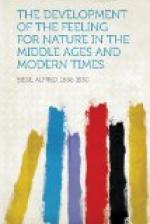When on the gentle Severn’s sedgy
bank
In single opposition, hand to hand,
He did confound the best part of an hour
In changing hardiment with great Glendower;
Three times they breath’d, and three
times did they drink,
Upon agreement, of swift Severn’s
flood;
Who, then affrighted with their bloody
looks,
Ran fearfully among the trembling reeds,
And hid his crisp head in the hollow bank,
Blood-stained with these valiant combatants.
Striking instances of personification from Antony and Cleopatra are:
The barge she sat in, like a burnish’d
throne
Burn’d on the water; the poop was
beaten gold;
Purple the sails, and so perfumed, that
The winds were lovesick with them; the
oars were silver,
Which to the time of flutes kept stroke,
and made
The water which they beat to follow faster
As amorous of their strokes.
And Antony, enthron’d in the market-place, sat alone
Whistling to the air, which but for vacancy
Had gone to gaze on Cleopatra too
And made a gap in nature.
Instead of accumulating further instances of these very modern and individual (and sometimes far-fetched) personifications, it is of more interest to see how Shakespeare used Nature, not only as background and colouring, but to act a part of her own in the play, so producing the grandest of all personifications.
At the beginning of Act III. in King Lear, Kent asks:
Who’s there beside foul weather?
Gentleman: One minded like the weather, most unquietly.
Kent: Where’s the King?
Gent: Contending with the fretful elements. Bids the wind blow the earth into the sea, Or swell the curled waters ’bove the main, That things might change or cease; tears his white hair, Which the impetuous blasts with eyeless rage Catch in their fury and make nothing of; Strives in his little world of men to outscorn The to-and-fro conflicting wind and rain.
In the stormy night on the wild heath the poor old man hears the echo of his own feelings in the elements; his daughters’ ingratitude, hardness, and cruelty produce a moral disturbance like the disturbance in Nature; he breaks out:
Blow, wind, and crack your cheeks.
Rage! Blow!
You cataracts and hurricanes, spout
Till you have drench’d our steeples,
drowned the cocks!
You sulphurous and thought-executing fires,
Vaunt couriers of oak-cleaving thunder-bolts,
Singe my white head! And thou, all-shaking
thunder,
Strike flat the thick rotundity o’
the world!
Crack nature’s moulds, all germens
spill at once
That make ungrateful man....
Rumble thy bellyful! Spit fire, spout
rain!




